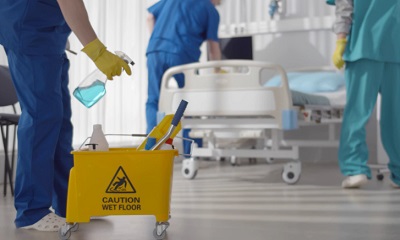Disinfectants: Study Finds That Chlorine Based Disinfectants Are Not Effective Against Superbug Clostridioides Difficile Especially In Hospital Settings!
Nikhil Prasad Fact checked by:Thailand Medical News Team Nov 25, 2023 1 year, 4 months, 3 weeks, 2 days, 10 hours, 9 minutes ago
Disinfectants: In the intricate landscape of healthcare-associated infections, Clostridioides difficile (C. difficile) emerges as a formidable adversary. Acknowledged as the primary cause of antibiotic-associated diarrhea globally, this Gram-positive, anaerobic bacterium poses significant challenges to healthcare environments. A recent in-depth study conducted by the University of Plymouth, unveiled during World Antimicrobial Awareness Week, has raised alarming concerns about the inadequacy of widely used chlorine-based
disinfectants, especially sodium hypochlorite bleach, in combatting C. difficile spores. The revelations from this research extend beyond immediate patient safety to underscore broader global issues surrounding antimicrobial resistance (AMR).
 Global Impact of C. difficile Infections
Global Impact of C. difficile Infections
C. difficile's impact on global healthcare is profound, causing a spectrum of antibiotic-associated illnesses. Exposure to antibiotics disrupts the colonic microbiota, leading to C. difficile colonization in varying percentages of adults and infants. The resulting C. difficile infection (CDI) spans from asymptomatic carriage to severe complications such as pseudomembranous colitis and toxic megacolon. With an annual toll of approximately 29,000 deaths in the USA and 8,500 deaths in Europe, the incidence of CDI was already surging before the COVID-19 pandemic, emphasizing its persistent threat within healthcare environments.
Chlorine-Based Disinfectants Under Scrutiny
At the heart of the study's revelations lies the efficacy, or rather, inefficacy, of chlorine-based disinfectants against C. difficile spores. Published in the journal Microbiology, the research highlights the startling fact that these disinfectants, commonly employed in hospitals, fail to eliminate the resilient spores, even at recommended concentrations. Sodium hypochlorite bleach, a prevalent chlorine-based chemical, proves to be no more effective than plain water in neutralizing the formidable C. difficile spores.
Urgent Need for Alternative Disinfection Strategies
With the escalating threat of AMR worldwide, the study's authors emphasize the immediate need for research to identify alternative strategies for disinfecting C. difficile spores. Dr. Tina Joshi, Associate Professor in Molecular Microbiology at the University of Plymouth, stresses the necessity to reevaluate current disinfectants and guidelines to align with bacterial evolution. The inefficacy of chlorine-based disinfectants raises critical questions about existing protocols in medical settings, necessitating a paradigm shift in disinfection practices.
Study Details and Alarming Results
The research employed a comprehensive approach, examining the response of C. difficile spores from three different strains to three clinical concentrations of sodium hypochlorite. This chlorine-releasing agent, commonly used in hospitals, was chosen to simulate real-world conditions. Strikingly, the results indicated that via
ble C. difficile spores could be recovered from fabrics such as surgical scrubs and patient gowns even after exposure to high concentrations of sodium hypochlorite, with no observable changes to spore morphology.
To delve deeper into the findings, the study utilized scanning electron microscopy to assess the outer spore coat's morphological changes after exposure to sodium hypochlorite. Surprisingly, the spores exhibited no visible damage, confirming their ability to withstand chlorine-based disinfectants.
The Persistence of C. difficile Spores
C. difficile spores are renowned for their resilience, with the capacity to survive exposure to various harsh conditions, including disinfectants, desiccation, and UV light. The study's findings underscore the persistence of these spores on fabrics commonly used in healthcare settings, necessitating a thorough reassessment of disinfection protocols.
The study reveals the potential risk posed by surgical scrubs and patient gowns as fomites in clinical settings. These fabrics, designed to protect against infection transmission, were found to attract and retain C. difficile spores, highlighting their role in potential spore transmission.
Implications for Future Research and Healthcare Practices
In conclusion, the study exposes a critical gap in current disinfection practices within healthcare settings. The inefficacy of chlorine-based disinfectants against C. difficile spores poses a serious risk to patient safety and calls for an immediate shift towards alternative disinfection strategies. The urgent need for research in this area becomes evident, with a focus on understanding the molecular basis of interactions between disinfectants and C. difficile spores.
As the global healthcare community grapples with the challenges of antimicrobial resistance, addressing the shortcomings in disinfection protocols becomes paramount. The study's call for a reevaluation of guidelines and the search for effective disinfection methods underscore the importance of staying ahead of bacterial evolution to ensure the safety of both patients and healthcare providers.
In light of these findings, future research directions should explore novel disinfection strategies tailored to combat the resilience of C. difficile spores. Mechanisms of action, including temperature, exposure time, and pH, should be thoroughly investigated to enhance the efficacy of disinfection protocols. The impact of chlorine-based disinfectant tolerance in healthcare settings, especially in low- to middle-income countries (LMICs), warrants further exploration, considering the essential role of cost-effective biocides in infection control.
Effective management of CDI requires a holistic approach, encompassing fresh preparations of chlorine-based disinfectants on the day of use, exploring antimicrobial surface wiping techniques, and investigating spore inactivation at varying temperatures. The study's findings stress the need for a nuanced understanding of C. difficile resistance to chlorine-based disinfectants, exploring whether this tolerance is merely observational or driven by genomic evolution.
In conclusion, this study serves as a wake-up call for the healthcare community, urging a comprehensive reevaluation of disinfection protocols to effectively manage C. difficile spores and reduce the global incidence of CDI. The alarming results underscore the urgency of action, prompting a shift towards more efficacious disinfection methods and a relentless pursuit of solutions to counter the persistent threat posed by C. difficile in healthcare settings.
The study findings were published in the peer reviewed journal: Microbiology.
https://www.microbiologyresearch.org/content/journal/micro/10.1099/mic.0.001418
For the latest about
Disinfectants, keep on logging to Thailand
Medical News.
Check Out:
https://www.thailandmedical.news/articles/covid-19-disinfectants
